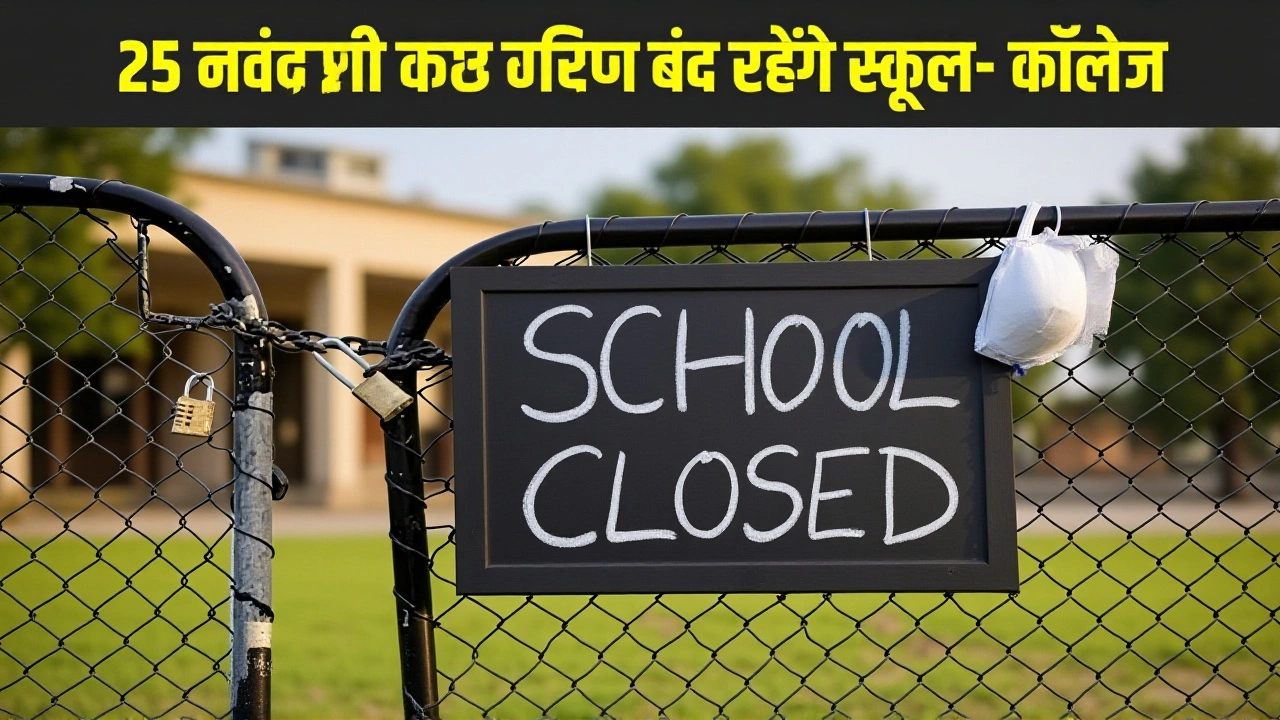Guru Tegh Bahadur Shaheedi Diwas 2025: UP, Delhi Move Holiday to Nov. 25 Amid 350th Anniversary

- Everett Marsden
- 24 November 2025
- 0 Comments
For millions of students across North India, the school calendar just got a surprise twist. While Guru Tegh Bahadur Shaheedi Diwas has always been observed on November 24—the day the ninth Sikh Guru was martyred in 1675—this year, the holiday is being moved to Tuesday, November 25, 2025, in Delhi, Uttar Pradesh, Haryana, and Chandigarh. Only Uttarakhand is sticking with tradition. The reason? The 350th anniversary of a sacrifice that reshaped religious freedom in India.
Why Move the Holiday?
The decision wasn’t arbitrary. It came from a quiet but deliberate push by state education departments to ensure public commemorations could be held with full dignity. November 24, 2025, falls on a Monday. By shifting the holiday to Tuesday, November 25, officials in Delhi and Uttar Pradesh aimed to create a longer window for large-scale events at Gurdwara Sis Ganj Sahib in Chandni Chowk—the very spot where Guru Tegh Bahadur was beheaded by Mughal Emperor Aurangzeb. Imagine the crowds: tens of thousands gathering for kirtan, ardas, and langar. A Monday holiday might have clashed with weekend travel or religious processions. Tuesday? Better flow. Better safety. Better reverence.
It’s not the first time a state has shifted a religious holiday for practical reasons. In 2019, Delhi moved the holiday for Guru Nanak Dev Ji’s birth anniversary from a weekend to a weekday to align with school closures. But this is the first time the 350th anniversary of a martyrdom has triggered such a coordinated change across multiple states.
Official Announcements and Confusion
On November 24, 2024, Manish Chauhan, Principal Secretary of Uttar Pradesh’s General Administration Department, issued Notification No. 11/2024/2025, officially moving the holiday from November 24 to 25. The document, stamped and signed, was distributed to all district magistrates and school heads. In Delhi, Chief Minister Rekha Gupta made the announcement on November 23, 2025, stating: “November 25, 2025, will be a public holiday on the occasion of the 350th Shaheedi Diwas. All schools, colleges, and government offices in Delhi will remain closed.”
But here’s the twist: the announcement came after the traditional date had already passed. That’s right. The decision was made on November 23, 2025—three days after the actual martyrdom anniversary. Parents, teachers, and students were caught off guard. Many had already planned family trips, tutoring schedules, or religious pilgrimages. Social media lit up with questions: “Is my child’s school closed on the 24th or 25th?” “Why now?”
Education departments responded with circulars, WhatsApp alerts, and helpline numbers. “We understand the confusion,” said a spokesperson from Delhi’s Directorate of Education. “But this isn’t about disrespecting history. It’s about honoring it properly.”
Who Was Guru Tegh Bahadur?
Many students today know the name, but few know the full story. Born in 1621 in Amritsar, Guru Tegh Bahadur was the youngest son of Guru Hargobind. He became the ninth Sikh Guru in 1665. By 1675, Mughal Emperor Aurangzeb was forcing conversions across North India. When Kashmiri Pandits—Hindu scholars—faced forced conversion, they turned to Guru Tegh Bahadur for help.
He didn’t raise an army. He didn’t flee. He went to Delhi. And said: “If you want to force conversion, convert me first.”
He was arrested with three companions—Bhai Mati Das, Bhai Sati Das, and Bhai Dayala—and executed publicly in Chandni Chowk on November 24, 1675. His body was cremated at the site now known as Gurdwara Rakab Ganj Sahib. His head was taken to Anandpur Sahib by a devotee, Bhai Jaita.
He didn’t die for Sikhism alone. He died for the right of all people to worship freely. That’s why he’s called Hind Ki Chadar—the Shield of India.

Why the Split Between States?
Uttarakhand’s decision to observe the holiday on November 24 stands out. Why? Because its Sikh population is smaller—around 1.2% of the state’s 11 million people, compared to over 10% in Delhi and 5% in Punjab-bordering districts of UP. In Uttarakhand, the observance is more symbolic. In Delhi and UP, it’s a mass event. The state government in Dehradun chose to honor the historical date precisely, while others prioritized logistics.
There’s also a quiet tension here. Some Sikh leaders in Delhi argue the shift dilutes the sanctity of the date. “The martyrdom happened on November 24. That’s sacred,” said Sardar Harpreet Singh, a trustee of Gurdwara Sis Ganj Sahib. “We’ll still hold prayers at dawn on the 24th. The holiday is for the public. The memory isn’t.”
Others, like Dr. Anjali Verma, a historian at Delhi University, see it as a sign of institutional maturity. “Governments are learning that religious observances aren’t just rituals—they’re public events that require planning. This isn’t changing history. It’s making space for it.”
What’s Next?
Look for this pattern to spread. With the 350th anniversary of Guru Tegh Bahadur’s martyrdom, states with large Sikh populations—like Punjab, Haryana, and even parts of Rajasthan—are likely to follow suit in future years. The central government, which doesn’t declare a national holiday for this day, may soon face pressure to standardize dates. For now, it remains a patchwork.
Students in Delhi and Uttar Pradesh will get an extra day off. But the real gift? A chance to reflect on what it means to stand for someone else’s right to believe.
Frequently Asked Questions
Why did Delhi and Uttar Pradesh move the holiday to November 25 instead of keeping it on November 24?
The shift to November 25, 2025, was made to allow for larger, safer, and more organized public commemorations at Gurdwara Sis Ganj Sahib in Delhi, where Guru Tegh Bahadur was martyred. November 24 falls on a Monday, which could have conflicted with weekend travel and religious processions. Moving the holiday to Tuesday ensures more families and students can participate without logistical strain, especially during the 350th anniversary year.
Is Guru Tegh Bahadur Shaheedi Diwas a national holiday in India?
No, it is not a national holiday. The Government of India does not declare it as such. It is observed as a state holiday only in regions with significant Sikh populations—primarily Punjab, Delhi, Haryana, Uttar Pradesh, Chandigarh, and Uttarakhand. Each state decides independently whether to grant a holiday and on which date.
What’s the difference between Guru Tegh Bahadur’s martyrdom date and the holiday date?
The martyrdom occurred on November 24, 1675—a fixed historical date. The public holiday, however, is an administrative decision made by state governments to facilitate observance. In 2025, most states moved the holiday to November 25 for practical reasons, while Uttarakhand honored the original date. The spiritual observance still takes place on the 24th; the holiday is just a day off for schools and offices.
How are schools and colleges being informed about the change?
State education departments issued official notifications and circulars to all government and private institutions. Delhi’s Directorate of Education sent alerts via email, SMS, and school portals. Parents are advised to check their school’s official website or contact the principal directly, as some private institutions may still observe the traditional date unless officially notified otherwise.
Why is Uttarakhand observing the holiday on November 24 while others moved it?
Uttarakhand has a smaller Sikh population and fewer large-scale public events tied to the martyrdom. The state government chose to honor the historical accuracy of the date rather than prioritize logistical convenience. This reflects a more symbolic, community-based approach compared to the urban, mass-event planning seen in Delhi and Uttar Pradesh.
What impact does this holiday shift have on students and families?
Millions of students in Delhi, UP, Haryana, and Chandigarh will get an extra day off on November 25, which may affect academic calendars and exam schedules. Families planning religious pilgrimages to Gurdwara Sis Ganj Sahib benefit from a weekday holiday, allowing more time for attendance without conflicting with work or school. However, the late announcement caused confusion, prompting education departments to issue clarifications and helplines.


